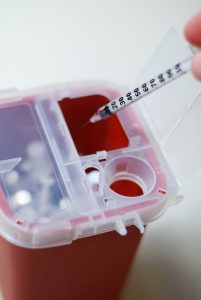The Four Types of Medical Waste
Generally, there are four major types of medical waste. What are they and how are they handled?
Anyone who manages medical waste, whether it’s in a busy hospital, laboratory, veterinary practice, or dental office, knows that waste is dealt with a bit differently than a traditional office. Whereas most offices will have recycling, shredding, or regular waste paper receptacles, those that deal with medical waste must adhere to strict laws of segregation and handling. Not all medical waste is handled the same, as it is categorized depending on the type of waste. Generally, there are four major types of medical waste. What are they and how are they handled?
General Medical Waste
General medical waste is the lion’s share of medical waste in a facility and is not typically considered hazardous. This includes paper, plastic, and office waste. These can disposed of regularly and don’t require any special handling.
Infectious Medical Waste
Infectious waste is just what the name suggests: it is waste materials that can pose a risk of infection to humans, animals, and the overall environment. This includes blood-soaked bandages, sharps waste, surgical waste, human or body parts, cultures, and swabs. Each state has comprehensive rules for the management of infectious waste, including requirements for storage, transport, disposal, licensing, and processing.
Hazardous Medical Waste
Hazardous waste is dangerous waste but is not considered infectious to humans. Believe it or not, sharps falls into this category as well, at least sharps that have not been used, because they have the ability to puncture or harm the user. Chemotherapy agents fall into this category, as well as chemicals, such as solvents, mercury in thermometers, and lead in paint.
Radioactive Medical Waste
Simply put, radioactive waste is waste that contains radioactive material. In a medical setting, this includes radioactive therapies for tests such as thallium stress tests, and other nuclear medicine therapies to treat certain cancers. Nuclear medicine uses radiation to provide diagnostic information about the functioning of a person’s specific organs, or to treat them.
Medical waste must be collected by a licensed medical waste hauler, as this waste disposal is closely monitored and regulated in most states. The waste must be treated and rendered harmless before it can be recycled or thrown away. Let RedBags.com take care of your disposal to mitigate risk, maintain compliance, and keep communities safe. In addition to treatment and disposal, we offer an online OSHA Compliance Training program designed to help facilities understand the four types of medical waste and how to handle them.
Contact RedBags.com today!

Service Areas: Long Island Medical Waste; New York City Medical Waste; Westchester Medical Waste and more!
